There are many different electric guitar string manufacturers on the market including Ernie Ball, D’Addario, and Elixir. If you count the companies that are less famous, there are probably even thousands of them. However, there are a few major organizations that stand out on top with Elixir being one of them.
Especially in the case of polymer-coated strings. Elixir is somewhat controversial among players – many people ask if they’re even worth the money considering their strings tend to go for a slightly higher price than normal.
Elixir brand strings are great strings with an equally as good reputation, which – in addition to the fact they’re dipped in a polymer coating – is another reason why they tend to cost more as well. However, not everyone likes them because of that very same coating.
I’ve used Elixir strings a few times in my life, but one of the reasons why I chose to use other brand strings is simply because of the price. However, many people swear by Elixir strings because of the polymer coating that protects them from grime, dirt, dust, sweat, and potentially even corrosion.
Rather than speculate on how good Elixir strings are, I did a 4-month comparison between Ernie Ball 11-48 gauge strings and Elixir’s 11-49 coated strings. You can see the results of this experiment near the end.
Comparing Elixir to Other Brands – The Experiment
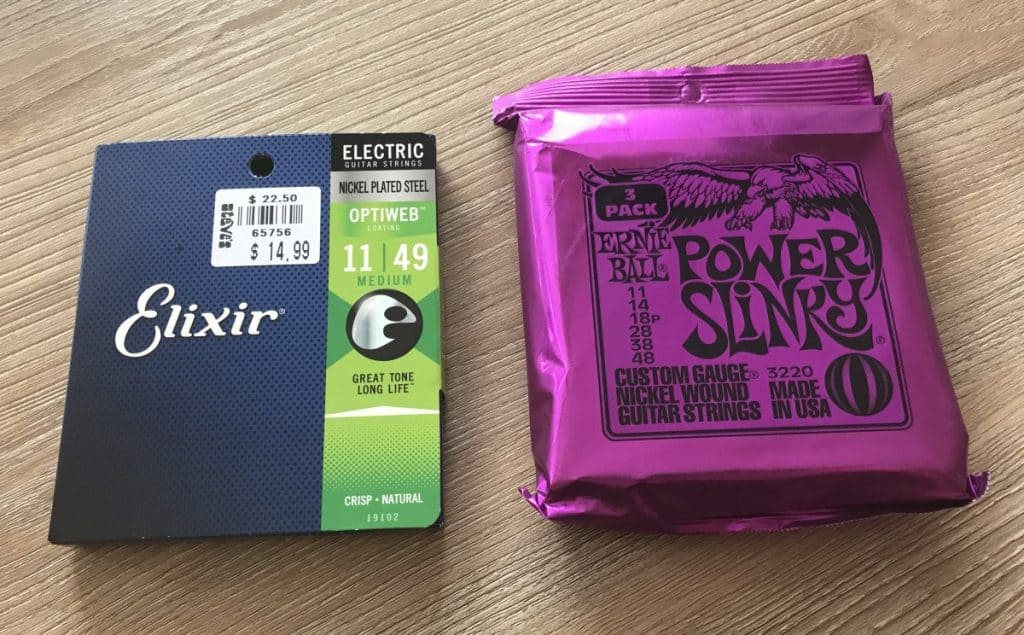
For this article, I purchased a pair of Elixir medium gauge strings (11-49) and put them on my PRS SE Custom 24, and then on my other guitar, my ESP Eclipse II, I used a regular pair of one of my old favourites.
Because I play the guitar almost every day, I oscillated between both guitars for around 30 minutes a piece each day, that way they shared the responsibility and they got relatively equal playing time.
This also means they were exposed to an equal amount of external stresses, ie, sweat, humidity, bending, dirt, and oils. Surprisingly, the results of this were fairly conclusive, in the sense that I can tell the difference between both sets of strings, big time.
Comparing Coated and Non-Coated Guitar Strings – The Experiment
1) I Put Elixir Strings 11-49 on PRS SE Custom 24 – April 8th, 2021
2) I Put Ernie Balls 11-48 on ESP Eclipse II – April 8th, 2021
3) I alternated between playing one guitar or the other on a daily basis for 5 months.
4) At 5-Month Mark, August 2nd
- Results
The Coated Strings Experiment on a Weekly Basis (5-Months) – Results
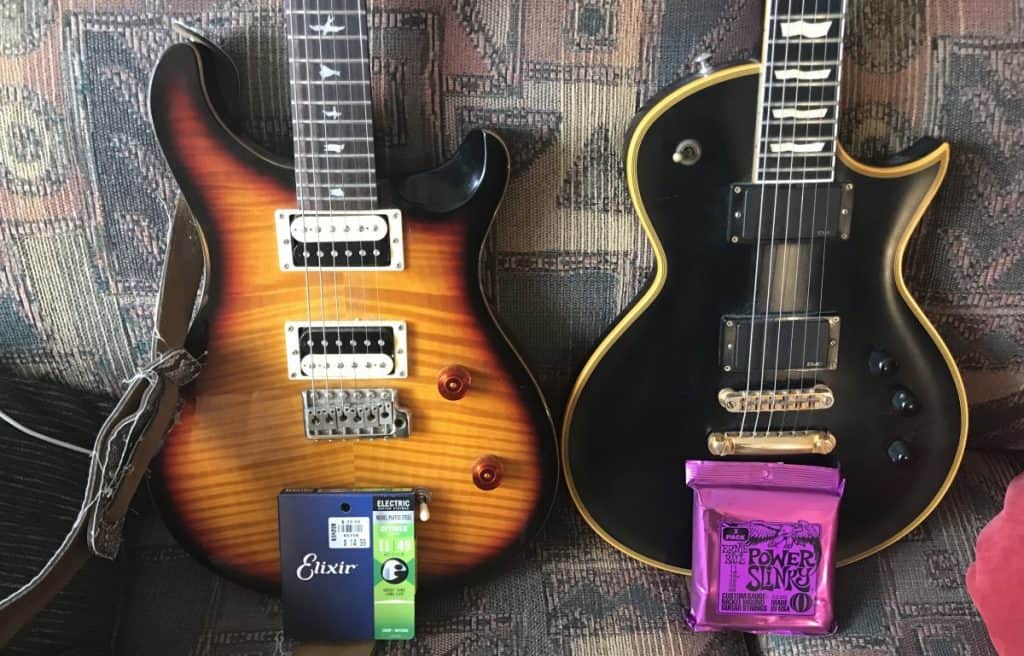
Week 20 Results – August, 2021
The first thing that I noticed with the Ernie Ball non-coated strings is that they began to lose their freshness and brightness after about a week or two, whereas the Elixirs – which tend to be less bright right off the bat – maintained their level as the weeks went by. You can see the results in this video:
After close to five months, Elixir strings do seem to be a bit more fresh and they certainly look cleaner than the non-coated strings. They have more brightness, and they seem to have fought off the grime-collection process a little bit more than the Ernie Ball Strings without the polymer coating.
I think the big question is whether the experiment was convincing enough for me to switch all of my strings to Elixir, and I would say no. I still think it’s best to put new strings on your guitar every month or two, assuming that you play the guitar every day like I do.
The reason for this is that there is no replacement for the sound of brand-new guitar strings. Despite the polymer coating, the strings are still worn, and they don’t have that fresh-string sound that I love so much. However, Elixir strings are perfect for the person who just wants to put one set of strings on their instrument and then not change them for 6 months.
Elixir Strings – Do They Really Protect Against Corrosion and Grime?
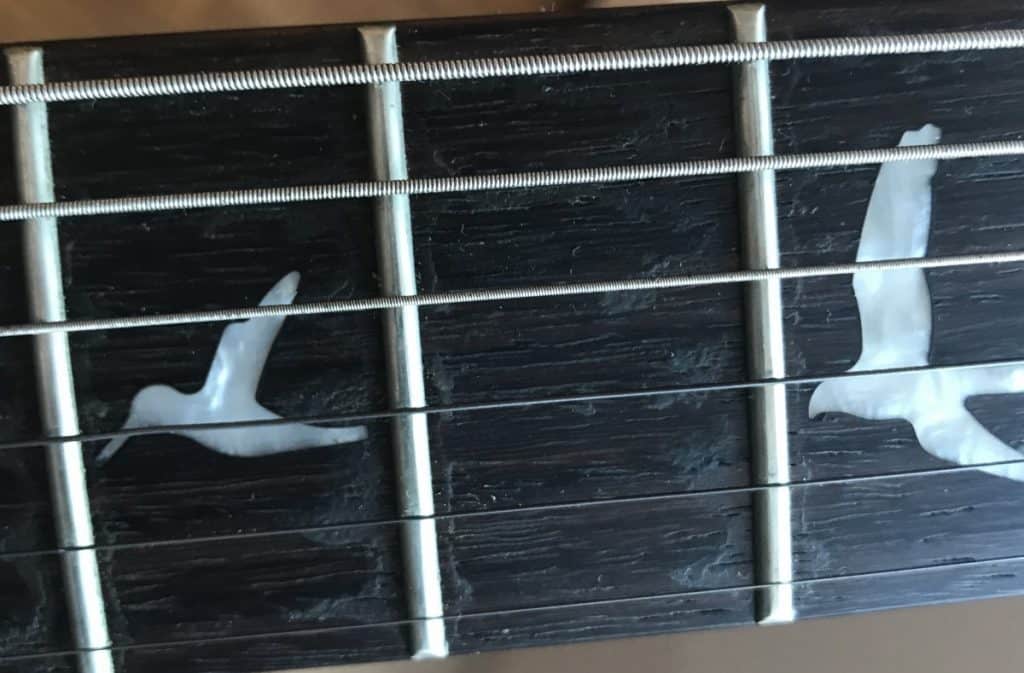
In my experience, I find that guitar strings, realistically, will last me anywhere between 2-3 months, however by the 2-3 week mark, I find the quality has already deteriorated substantially.
And by that, I mean the strings sound very bright, fresh, and perfect for about 3 weeks (more on how long strings last in my guide), and then I usually continue using them for another 2-3 months even though they have since lost that coveted brightness and clarity.
Many people report entirely different findings when it comes to their guitar strings because it honestly depends on how much you sweat and the acidity of that sweat. For example, some people have to change their strings a lot more than others simply because they sweat all over them.
One way of getting around that, by the way, is to simply wipe the strings and the neck off with a towel of some kind, ideally a delicate one.
Regarding the Elixir versus Ernie Ball strings debate, after a few months, I think it’s clear the Elixir strings really do last a bit longer because of the polymer coating. They tend to retain that brightness and clarity although there is somewhat of a decline in the sound.
On the other hand, I find that the Elixir strings, because of that very same coating, don’t sound quite as bright and don’t have the same out-of-the-box sound that non-polymer-coated strings have.
In other words, there is a compromise in brightness and freshness for a much longer lasting string. It’s clear to me that Elixir strings really do last a bit longer than your average run-of-the-mill strings.
However, not everyone likes Elixir and other polymer-coated strings. In fact, if you check out this YouTube video right here, the guitarist in the video explains precisely why he doesn’t like them and the video got quite a bit of negative attention.
Essentially, he argued that the guitar is harder to set up and causes more fret buzz because the strings have this coating on them that slowly wears away with time. And there is some truth to that.
Elixir strings, after a while, will start to slowly degrade as the polymer coating fades away, especially right over the top of the place where the string and fret collide. He says the frayed ends can cause a bit of fret buzz there.
The Main Benefit of Using Elixir Strings
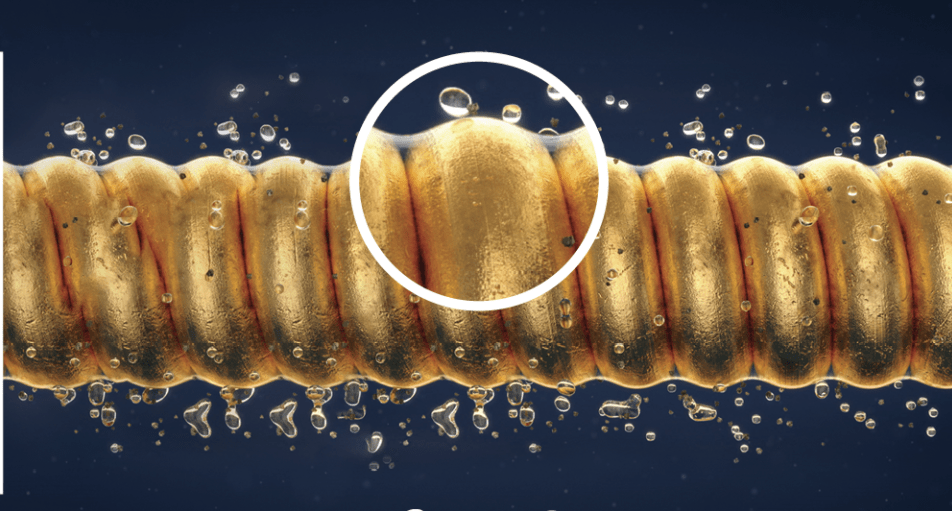
1) They Last Longer
Obviously, the main reason why players choose Elixir strings is that they tend to last much longer than non-coated guitar strings.
They are especially good for people, like I mentioned above, who sweat a lot and tend to cause the string to degrade and quickly accumulate grime and dirt. So if you’re one of those people, then Elixir strings will probably be great.
From the comparison video that you can see down below, I think it’s clear that the Elixir strings sound better just a few months later compared to the non-coated strings.
With all that said, some players actually choose Elixir strings because of their sound and feel, rather than their longevity.
2) You Don’t Have to Change Them After Months of Inactivity
One of the main reasons why I recently got my hands on Elixir strings (not just because I wanted to compare them for this article), is that non-coated strings seem to rust, corrode, or degrade after they have sat for a few months in my apartment, even if I haven’t bothered to play them.
For example, I changed the strings on my PRS and ESP Eclipse II just a few months ago and I have barely even touched either of them, but the strings are already ruined.
Elixir strings are a better option, in my opinion, if you have to change your strings but there is a good chance you won’t be touching the instrument for a couple of months or for however long. Put simply, if you intend on having your guitar in the closet or sitting on the stand for the next year, elixirs are probably the best choice.
3) They Tend to Tune Faster
If you know anything about guitar strings, the one thing you know is that they have to be bent and played with for a little while before they’re officially “ready.” Once you put a fresh pair of strings on, they tend to stretch a bit, in many cases, more than 2-3 times.
One way of getting around this is to literally pull and bend on them repeatedly and then tune them up to pitch right after.
That’s how my old guitar teacher did it, however, I don’t approach it in this way. What I like to do is I bend each string about a full-step; I do this several times to each string after tuning it, and I do it until it goes out of tune again.
Then, I re-tune it again and then I repeat the process until they no longer go out of tune anymore after a bend. In the case of Elixir strings, it seems like you don’t have to do that as much with them, for whatever reason. I imagine it’s because of the polymer coating.
4) They Don’t Squeak as Much
Another big reason why a lot of people like to use Elixir strings (or don’t like to use them, frankly), is that they aren’t as loud and they don’t squeak as much. This is a big advantage if you record a lot of acoustic guitars because finger squeaks in guitar recordings can be a big issue for a lot of players.
Eliminating finger squeaks isn’t that hard in post-processing, in fact, I have a whole article on the subject on my other site, Producer Society.
Either way, it’s nice that they don’t squeak as much as non-coated guitar strings. You don’t have to buy Elixir strings to get this effect, however, you just need coated strings.
Drawbacks of Using Elixir Strings
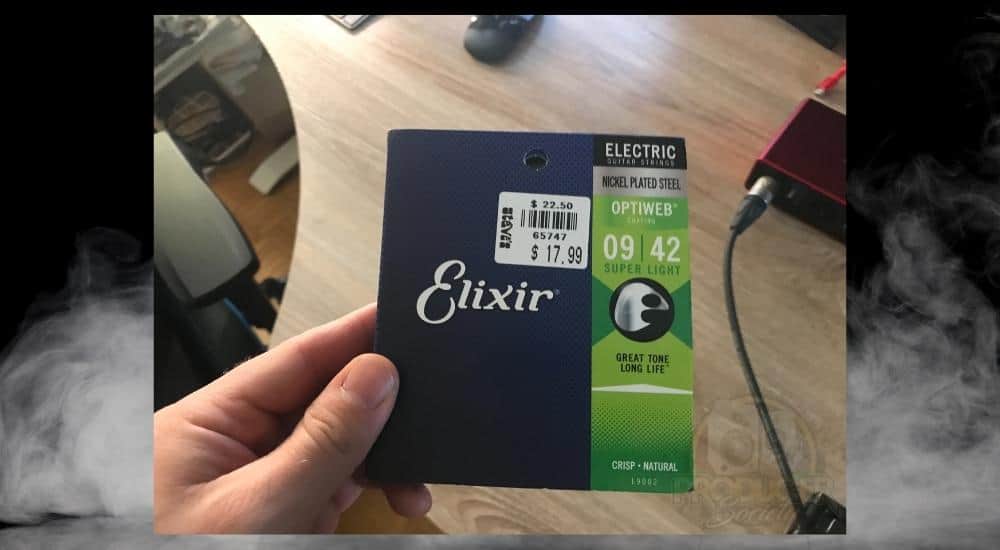
1) Tone Isn’t As Bright
As I briefly explored near the start of the article, I find Elixir strings just aren’t quite as bright and clear sounding, and this makes a lot of sense because the more mass is attached to the string, the more it has to vibrate in order to get the same sound.
It’s simple physics that if the string weighs more and there is more mass, it’s not going to vibrate with the same intensity as a string that weighs less.
Moreover, if the string has a coating on it, it won’t have the same amount of sustain either because the coating stops it from continuing to vibrate at the same pace. There is more mass and material, therefore, the vibration slows down much sooner.
2) The Price
Personally, I don’t mind paying the extra money to get a slightly better product, especially if it means the product will last much longer than others on average.
However, for many people, the price of Elixir strings will be the main turn-off for them, as it was once for me when I was a lot younger and had to save every dollar I had.
It seems like Elixir strings are at least twice the money that you can pay for other strings from companies like Ernie Ball and D’Addario.
3) They Can Fray and Cause Fret Buzz
Another big reason why a lot of people shy away from Elixir strings has to do with the fray where the polymer coating degrades. In other words, after you’ve used Elixir strings for quite some time, you’ll find that the polymer webbing starts to fray and literally break apart, which can lead to fret-buzz.
The frayed polymer coating hangs off the strings and vibrates against the fret whenever you strike the string.
One way to get around this is to just tear off the fray with tweezers or your fingers, or you can literally file it off with a nail file or something like that, but regardless, the frayed coating can cause fret-buzz, so pay attention.

 Written By :
Written By :